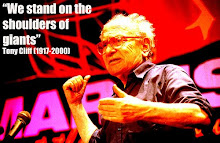 A major challenge for Cliff, arriving in Britain after World War Two, was explaining the relative lack of economic depravation. While there was still poverty, it clearly wasn't a re-run of the hungry 30s, an era of mass unemployment.
A major challenge for Cliff, arriving in Britain after World War Two, was explaining the relative lack of economic depravation. While there was still poverty, it clearly wasn't a re-run of the hungry 30s, an era of mass unemployment. This was a puzzle because Trotsky, who died in 1940, had predicted a crisis for capitalism after the war. Orthodox Trotskyists assumed Trotsky must have been right so - despite the evidence of their own eyes - they clung to the belief that the system was entering, or about to enter, a crisis.
Posted item #12 'The permanent arms economy'
Cliff realised that if theory and reality don't match it must be the theory that's wrong - so he set about developing an explanation for the emerging post-war boom. Together with Michael Kidron, a young comrade in the International Socialists, he evolved an account - in the second half of the 1950s and early 60s - of postwar Western capitalism.
This account explained the boom, but also pointed to the system's underlying instability - the prosperity couldn't last forever, and at some stage there would be a return to the cycle of boom and slump. When the global economy entered recession in around 1973 Cliff and Kidron were proved absolutely right.
Their account was labelled a 'theory of permanent arms economy', as it emphasised the role of mass investment in arms production - especially from the US, by now economically dominant - in sustaining the boom. Along with the theory of state capitalism (which explained the Soviet Union and Eastern Europe) and his account of 'deflected permanent revolution' (which made sense of changes in large parts of the 'Third World'), Cliff's analysis of Western post-war society provided an overall picture of the world system.
This theoretical troika enabled IS supporters to remain firm and consistent in a politically difficult climate. The left was dominated by supporters of offical Communism or those who subscribed to reformism - at a time of stability and prosperity for Western workers, there was little opening for a revolutionary anti-capitalist alternative. But the steadfastness and patient work of IS activists in the 50s and 60s laid the basis for larger-scale poltical interventions in the crisis-ridden 70s and beyond.

This comment has been removed by a blog administrator.
ReplyDelete